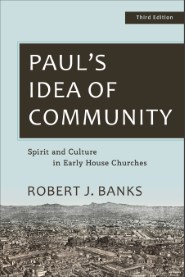Paul’s Idea of Community: Spirit and Culture in Early House Churches, 3rd ed.

Overview
This highly readable investigation of the early church explores the revolutionary nature, dynamics, and effects of the earliest Christian communities. It introduces readers to the cultural setting of the house churches of biblical times, examines the apostle Paul’s vision of life in the Christian church, and explores how the New Testament model of community applies to Christian practice today. Updated and revised throughout, this 40th-anniversary edition incorporates recent research, updates the bibliography, and adds a new fictional narrative that depicts the life and times of the early church.

- Explores the revolutionary nature, dynamics, and effects of the earliest Christian communities
- Introduces readers to the cultural setting of the house churches of biblical times
- Examines the apostle Paul’s vision of life in the Christian church
- The Sociocultural and Religious Settings
- The Gospel of Other-Directed Freedom
- Church in Family Business Residences
- Church as Present Heavenly Reality
- The Community as a Loving Household
- The Community as an Organic Harmony
- Mutual Learning and Testing of Faith
- Common Meals and Signs of Fellowship
- The Sharing of Gifts and Ministry
- The Interplay of Grace and Order
- Unity and Diversity among the Members
- The Contribution of Women in Church
- Abolishing Religious Distinctions between Members
- Defining Leadership by Function, Not Position
- The Role of Visiting Missioners
- The Link between Mission and Church
- The Nature of Paul’s Authority
- The Exercise of Paul’s Influence
- Conclusion
- Appendix 1: The Drift of the Pastorals
- Appendix 1: The Drift of the Pastorals
- Appendix 2: Going to Church in the First Century
Top Highlights
“These groups bound people together on a basis different than that of geography and race or natural and legal ties. Their principle was koinōnia, voluntary partnership around a common interest.” (Page 8)
“In his view of knowledge Paul stands closest to the Jewish teachers of his day. Both look to the OT, in which knowledge of God comes through neither human speculation nor mystical illumination. It arises from a personal encounter with the dynamic Word of God and the prophet’s mind, with human insight, visionary experience, scriptural exegesis, and situational discernment playing a subordinate role.” (Page 65)
“Social differences were not treated as if they did not exist, nor were they subjected to an indiscriminate leveling process. They were used to benefit others.” (Page 100)
“So, then, Paul’s use of everyday words to describe basic aspects of church life demonstrates his desire to overcome the usual sacred/secular dichotomy.” (Page 113)
“Paul’s understanding of community is never static or codified. It is a living thing, always open to refinement and aimed at relevance.” (Page 6)
For years I have required students in a seminary elective I teach to read two books: Paul’s Idea of Community and Going to Church in the First Century—both by Robert Banks. Imagine my delight to find the two works in a single volume and to find it now updated to factor in more than twenty-five years of ensuing Pauline scholarship. When I encountered the first edition of the book decades ago, Paul’s Idea of Community contributed significantly to my own pilgrimage as a scholar. All of us who are indebted to Banks’s seminal work in Christian social history will welcome the third edition of this classic.
—Joe Hellerman, Talbot School of Theology
Banks’s book was transformational for students and scholars because of his insight into the house churches, the dynamics of community, and the roles of women in the early church. I have personally used this book with students for many years, and their responses have always been positive and enthusiastic. Banks's writing is even more relevant today because of prevalent restrictive interpretations of Scripture. This contemporary update enhances our understanding of Paul’s letters and sheds light on the principles guiding ministry, equality, and leadership that are so necessary in today’s world. I highly recommend this readable and challenging work for all who wish to increase their understanding of our biblical tradition.
—Helen Doohan, professor emerita, religious studies, Gonzaga University
A classic just got even better! Robert Banks’s Paul’s Idea of Community has helped many, many people to understand what it was like to be part of Paul’s Christian communities. In this book Banks asks how these communities were similar to other groups in the first-century world—and how and in what ways they were different. This new edition will ensure that Banks’s highly valuable insights into these significant questions continue to help us all to understand the dynamics of Paul’s Christian communities. And having Banks’s wonderful narrative, Going to Church in the First Century, as part of the book is a great bonus too!
—Paul Trebilco, professor of New Testament studies, University of Otago, Dunedin, New Zealand
- Title: Paul’s Idea of Community, 3rd Edition: Spirit and Culture in Early House Churches
- Author: Robert J. Banks
- Edition: 3rd Edition
- Publisher: Baker
- Publication Date: 2020
- Pages: 240
- Resource Type: Monograph
- Topic: Early Church